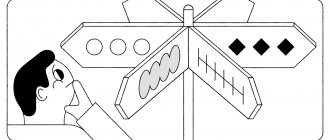Internal anxiety, the difficulties of relationships, haunting failures and failures, psychosomatic diseases that come from nowhere - all this interferes with life, does not allow one to believe in the future and respect oneself, causes not only mental, but sometimes physical pain, and can lead to despair and depression. At all times, mental restlessness, confusion of thoughts and feelings have brought torment to a person and led him to seek help. It was provided by priests and monks, confessors and simply close friends. Today, anyone in need of such support can seek, among other things, professional psychological help .
Those who decide to turn to a psychologist or psychotherapist for the first time have many fears and questions: how they will work with him, what this work consists of, whether he will fall under a kind of “X-ray” that will highlight what a person is not ready to show to another , what diagnosis will be given to him. Work experience shows that all these worries recede into the background, bringing forward a great desire to speak out, to be heard, understood and to receive help - relief from internal pain.
Help from a psychologist is, first of all, an opportunity to get rid of the feeling of loneliness when you are left alone with your problems, an opportunity to talk about them openly, without fear of negative value judgments. After all, the presence of a problem does not characterize you as “bad” or “wrong”, but only speaks of temporary inability, the inability to recognize its true causes and see solutions, which, as a rule, go beyond the usual ideas and patterns of behavior.
An open, confidential conversation about the complexities of life and the feelings experienced, a joint analysis with a psychologist of past events and the present that follows them, the choice of solutions that can resolve a painful situation and ease the suffering of the soul - this is what professional help and support implies, what we offer you .
I won't be left alone
Being alone is the dream of many. But not those who suffer from autophobia. Moreover, this problem manifests itself in different ways. So, for example, some people simply feel discomfort when they are left alone - they feel uneasy, have nothing to do, cannot concentrate on anything. Others may well panic and feel useless.
Article on the topic
The art of saying no. How not to feel guilty Psychologists often associate autophobia with a person’s childhood, for example, if he suffered a serious loss - a loved one, friend, etc. Also, a similar phenomenon can develop if a child has not received sufficient attention from his parents for a long time.
A person who is afraid of loneliness should not try to cope with the problem by ignoring his condition, believing that it will go away on its own. On the contrary, you need to go somewhere more often, make new friends and look for company. Nothing will happen on its own.
What is fear?
Here's something else you need to remember about fear: having developed into “reasonable people,” we now create almost all of our fears ourselves .
What do you associate your life and your actions with?
We scare ourselves by imagining how bad things will be for us if we do this or find ourselves in such and such a situation.
Psychologists decipher the word “fear” this way:
Associations with the Worst that have become reality
We always have a choice - to remain prudent or to be afraid of something that will most likely never happen. Take risks or stay in your comfort zone.
Insects, away!
Spiders often cause the development of so-called arachnophobia in humans. The nature of fear is simple: they have a specific appearance, in addition, many people extremely dislike their ability to suddenly appear out of nowhere - in just a minute they can appear right in front of your nose, descending on their web.
Article on the topic
It's scary to say! We get rid of the fear of speaking in public. Arachnophobia is also well cultivated by various horror films, where mystical significance is often attributed to spiders.
Diagnostics - why the fear of death appeared
According to the expert, this disorder does not cause difficulties in diagnosis. The person himself will tell you about his fears; you should ask him the appropriate questions. Another thing is that in our country it is not customary to turn to psychologists, and especially psychiatrists, if even strong fears arise that threaten to develop into a serious mental disorder. It is also not customary to communicate with loved ones about worries about imminent death or their loss. These conversations are often met with hostility, and the person who tries to talk about their fears is advised to “just get them out of your head.”
Unfortunately, this advice is unlikely to help. Because if a person is ready to tell his loved ones about his problem, it means it has already seriously matured and developed. And in this case, it is vitally important to contact a specialist - a clinical psychologist or psychotherapist, since it is unlikely that you will be able to cope with it on your own.
If a loved one does not talk about the fear of death, but you notice that he refuses to watch films in which someone dies or reacts extremely strongly to such stories, you should worry. The first step to solving the problem will be a heart-to-heart conversation, after which you also need to contact a specialist. If thanatophobia is left unattended, it will lead to extremely dangerous consequences.
pixabay.com/
Refusal from public speaking
Performance anxiety has now been dubbed the scourge of modern times. After all, it is becoming increasingly difficult to find a person who does not have stage fright. According to research, 96% of the world's population suffers from glossophobia. As a rule, it manifests itself in the fear of speaking in front of a large audience. But it also concerns interviewing and passing exams. At the most crucial moment, a person becomes covered in perspiration, gets nervous and even panics, has a dry mouth, trembling all over his body, and his legs become weak.
The feeling of the inevitable - where does the feeling of fear of death come from?
It is human nature to strive for security, and everything that is unknown to us causes anxiety. Death is both inevitable and unknown, and therefore creates a natural desire to avoid it. Don’t think about it, don’t talk about it, don’t discuss it with friends and family, just don’t attach any importance to it - it’s a calmer way to live, and that’s normal.
But sometimes situations arise when it’s simply impossible not to think. The first time this happens is in early childhood, when the child understands that his parents are older and one day they will be gone. This discovery usually does not become a test for the child's psyche. Kids quickly outgrow this fear and don’t think about it for a long time.
In adulthood, it usually occurs in response to a stressful situation. When the person himself is in danger and suddenly realizes how fragile his life is and that it could end suddenly. This can be a serious reason for anxiety and the development of depression. Another “dangerous moment” is the loss of a loved one. The realization that he lived, talked, laughed, thought about something just yesterday, but today he is gone, makes you rethink your own values.
“The fear of death is called thanatophobia,” comments clinical psychologist and psychotherapist Nikolai Chadayev. - This is a condition in which a person thinks about death, his own or those of loved ones. And this causes severe anxiety, depression, which can turn into fixation and lead to suicide.”
pixabay.com/
For fresh air? Will not go
There are also people for whom it is best to stay at home. They are called agoraphobes, i.e. those who experience an obsessive fear of open space. This condition is often observed in those who suffer from panic attacks.
Article on the topic
One among strangers. Will a social phobia be able to live a full life? At the same time, agoraphobia can include several interrelated and overlapping phobias, for example, fear of traveling alone, traveling on public transport, fear of going to stores, leaving the house, etc. The main symptoms of the pathology include disorientation, dizziness, increased heart rate and even stomach upset.
How to cope?
Most people who are susceptible to phobias and are aware of this are ready to be treated for them. In this case, it is possible to cope with the problem in 90%. The effectiveness of treatment directly depends on both the type of phobia and the person himself.
One of the methods is often characterized as “knocking out a wedge with a wedge,” i.e. when a person is exposed to his fear object.
Article on the topic
There is no more fear to be had. Psychologist about mass phobias, zaumi and the benefits of a crisis. Moreover, this interaction often happens for a long period of time, when he does not even have the opportunity to escape and defend himself. The purpose of this treatment option is the idea that until a person looks his fear in the eye, he will not be able to cope with it.
The other method is completely opposite. It is based on opposition. Here, on the contrary, a person is taught relaxation methods that will allow him, in moments of anxiety, to relax and stop being afraid. Thus, he moves away from his fear and calms down.
Naturally, all treatment requires contacting a professional specialist - a psychologist, and in some cases, a psychotherapist.
“I’m afraid to live”: why does this happen and how to help yourself?
We are reading encouraging news. The coronavirus is receding, shops and parks are opening around the world. People go back to work and try to live a normal life again. For some reason, not everyone succeeds. “I’m afraid to live” is one of the most popular requests at doctor’s appointments today. So why are many of us afraid to live?
The risk of contracting coronavirus has not disappeared. Economic problems in the country are growing. Finally, we found ourselves face to face with a brave new world, to which we must somehow adapt: wear a mask even in the heat, sit at a considerable distance from others, apply for a pass to go about our business, constantly remember not to touch your face . And God forbid you sneeze somewhere in a store, because then the “epidemiological police” in the person of pensioner grandmothers from the checkout line will almost come at you with pitchforks and torches.
The first thing you need to do is tell yourself honestly: the crisis is not over yet. In a sense, it has just begun. The rules of the game in this world have become more complicated, and there will be no going back. For some this means looking for a new job, for others it will be necessary to change their qualifications; Some lost loved ones during the pandemic; for others, self-isolation ended in divorce.
Important questions
The personal universe of many people is now in ruins. The first step is to acknowledge this fact. Then you can move on. What to do? To start, ask yourself a few questions.
"What do I want?"
These two months may have helped you listen to yourself for the first time and understand that you are not living the way you would like.
“What exactly am I afraid of?”
The phrase “I'm afraid to live” usually hides some specific fear. This could be the fear of failure or the feeling of the meaninglessness of life, the fear of doing something imperfectly or receiving the disapproval of others. Try to answer yourself honestly: what exactly are you afraid of?
“What can I change?”
We cannot influence the virulence of the coronavirus, so COVID-19 remains highly contagious, and nothing can be done about it. But we can read books, exercise, call loved ones, learn new things, send out resumes in search of a new job, or... do nothing. Yes, sometimes you have to do nothing to change something. If you feel confused and don't understand how to move on, take a short break. If possible, give yourself a little digital detox, spend this time in silence without social networks and TV series. Perhaps it is then that important answers will come by themselves.
How to deal with excessive anxiety
Here are a few simple life hacks that will help your brain overcome feelings of fear and uncertainty.
Move
Movement is the easiest way to “stir up” your mind. Even a twenty-minute walk improves systemic circulation and provides a little dopamine, which means you will be motivated to do something. Seize the moment and do something that will help trigger the dopamine reward cycle and take your mind off your worries.
Make a decision
Often we cannot make a decision, we are afraid that it may turn out to be wrong. However, facing the consequences of an unsuccessful step is better than suffering from inaction and uncertainty.
Just start
There is a well-known saying among yogis that the most difficult thing in yoga is unrolling the mat, that is, starting the practice. This is true for any matter that causes fear. Sometimes you just need to start without thinking that you might not be happy with the result or that you won't be able to do enough. After all, a little is better than nothing. And a negative result is a useful experience that will help you not repeat mistakes in the future.
Use the “two things a day” principle
List two small things to do during the day. Making a cake, helping your child with homework, doing a manicure, or editing your resume are examples of such small tasks. Avoid trying to do everything at once; this easily causes frustration. While two small things will help you feel quite effective and not lose motivation for tomorrow's tasks.
Contact a specialist
Sometimes it happens that behind the phrase “I’m afraid to live” serious problems are hidden. These could be thoughts of suicide against the background of a depressive disorder, the “don’t live” attitude received in childhood, social phobia and much more. And here you cannot do without consulting a psychiatrist, and sometimes a psychotherapist. Don't be afraid to seek professional help when needed.










